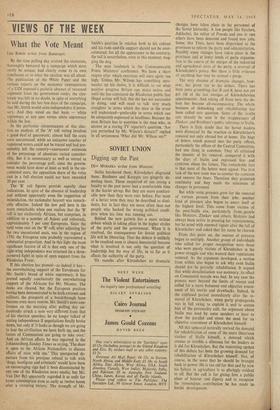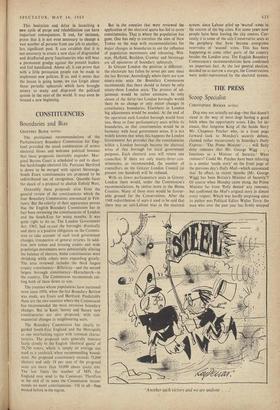DEV MURARKA writes from Moscow: Stalin butchered them, Khrushchev disgraced
them. Brezhnev and Kosygin are gingerly de- moting them. Those suspected of too strong a loyalty to the past never had a comfortable time in the Soviet set-up. But they are more comfort- able now than they were ever before. For want of a better term they may be described as dissi- dents, but in fact they are more often than not people who backed the wrong political candi- date when his time was running out.
Behind the new pattern lies a most serious debate which is taking place in the higher circles of the party and the government. When it is resolved, the consequences for Soviet political life will be liberating. That the debate is unlikely to be resolved soon is almost immaterial because what is involved is not only the question of leadership but the way of life, in so far as it affects the authority of the party.
Six months after Khrushchev no dramatic changes have taken place in the personnel of the Soviet hierarchy. A few people like Ilyichev, Adzhubei, the editor of Pravda and one or two others have been demoted and found new jobs. Some, like Titov, have been dispatched to the provinces to reform the party and administration. Possibly some changes have taken place in the provinces and at lower levels of party organisa- tion in the course of the merger of the industrial and agricultural units of the party. a reversal of Khrushzhev's policy. But there is little evidence of anything that may be termed a purge.
The very absence of dramatic changes. how- ever, has given rise to the debate. There has been some grumbling that B and K have not yet got rid of the last vestiges of Khrushchevian appointments. And taking off from here the de- bate has become all-encompassing. The whole business of debunking and rehabilitating has been called into question. Some of the results can already be seen in the reappearance of Zhukov, and Brezhnev's public reference to Stalin.
There is little doubt that the Soviet leaders were dismayed by the reaction to Khrushchev's removal not only abroad but at home. The bags of letters which poured into the party offices, particularly the offices of the Central Committee, had one thing in common. They all criticised the manner of his removal, compared it with the days of Stalin and expressed fear and cynicism about the future. The remarkable fact is that most of the letters were signed. The first task of the new team was to combat the cynicism and remove the fears. Therefore they promised continuity and they made the minimum of changes in personnel. • But while some pressure grew for the removal of various persons from their jobs. another kind of pressure also began to assert itself at the highest level. This came from victims of the post-Stalin era, particularly from. people like Molotov, Zhukov and others. Molotov had always been active in pressing for reinstatement, but he acted with renewed vigour aftCr the fall of Khrushchev and asked that his name be cleared.
From this point on, the sources of pressure began to multiply. Another group of individuals who called for proper recognition were those who were purely victims of Khrushchev in the power struggle and who wanted their reputations restored. As the argument developed, a section from within also began to ask why even Stalin should not be partially rehabilitated. It argued that while destalinisation was necessary, its effect on Communist morale was bad. In any case the process went beyond the limits of reason and called for a more balanced and objective assess- ment of his merits and drawbacks. Indeed, in the confused period immediately after the re- moval of Khrushchev, when party propaganda was in full swing to explain it and to accuse him of the personality cult, the argument about Stalin was used by sonic speakers at least to draw the parallel and stress the need for an objective assessment of Khrushchev himself.
All this upheaval naturally revived the demand for rehabilitation of some of the more illustrious victims of Stalin himself, a demand which creates as terrible a dilemma for the leaders as it did for Khrushchev. But the interesting upshot of this debate has been the growing demand for rehabilitation of Khrushchev himself. Not, of course, in the sense that he should be brought back to power. He is too old for that and by now his failure in agriculture is so glaringly evident to all. But the call is for giving him a public place of honour and dignity and to recognise the tremendous contribution he has made to Soviet development.
This hesitation and delay in launching a new cycle of purge and rehabilitation can have important consequences. It can, for instance, prove that it is not even necessary to change a vast number of persons from one job to another, less significant post. It can establish that it is not necessary to create a new class of disgruntled and disaffected party functionaries who will bear a permanent grudge against the present leaders and feel humiliated. Above all, it can prove that with a little persuasion people can be made to implement new policies. If so, and it seems that the lesson is going home, we can forget about those periodic upheavals which have brought misery to many and disgraced the political system in the eyes of the world. It may even be termed a new beginning.



































 Previous page
Previous page